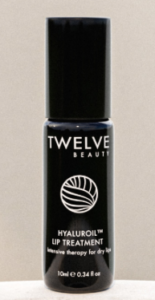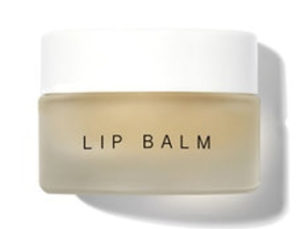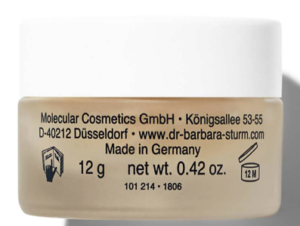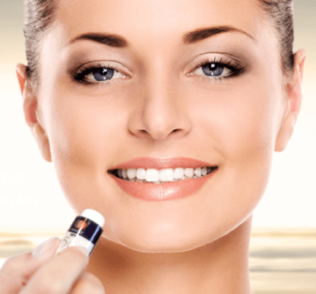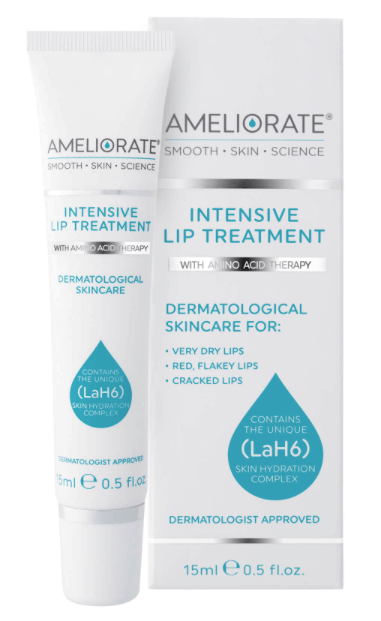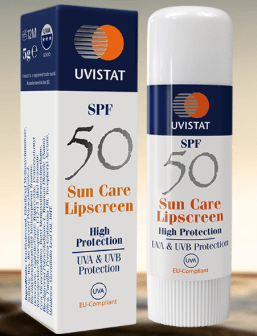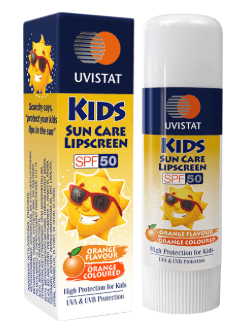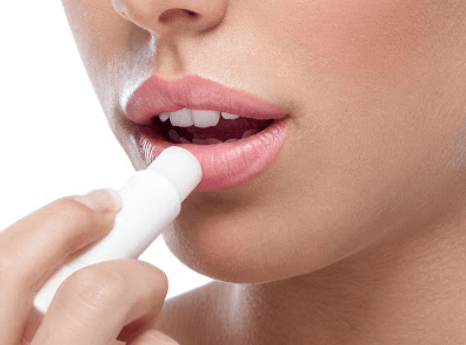Many people suffer from the discomfort of dry lips. Our lips are covered with a delicate thin layer of skin that is very sensitive to the elements, and this can ultimately lead to them cracking and becoming very sore. This shows that many of us could do with some extra help to keep our lips smooth and prevent dehydration.
The Main Causes Of Chapped Lips:
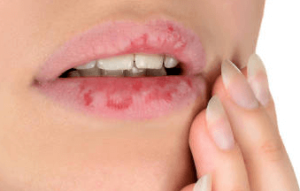
Lips don’t have oil glands like other parts of the skin, this means they are more prone to drying out and becoming cracked. Lips lose their moisture between four to ten times faster than other parts of the face or body.
The Main Causes Of Chapped Lips:
Environmental chapping due to severe weather and wind.
Irritation caused by excessive lip licking.
Strong – severe substances in skin care products such as anti-aging skin products or acne products that transfer to the lips.
Allergic reaction to foods, beverages, lip balms, and dental products that come into contact with your lips.
Are Your Lips Chapped Due To The Weather?
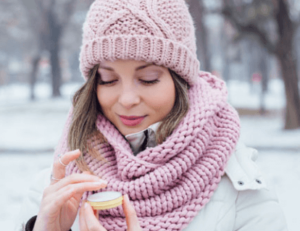
When there is a lack of moisture, this leaves lips vulnerable during the cold winter months when the air can be dry, and there is little humidity. Freezing temperatures and wind draw moisture out of your skin, and lips.
As the body temperature drops and the blood vessels in the lips close, this reduces the oxygen supply that goes to the lips, this is known to cause dry, chapped lips.
Another of the more significant reasons for dry lips is frequent sun exposure during the summer months. But, a word of caution, even when the sun is not shining brightly, and there is cloud cover, lips still need protection against damaging UV rays.
Hot, dry weather and constant exposure to the sun will very quickly dry lips out and burn the very delicate skin, lips need a lip balm with a high sun protection factor during the summer months.
Spending too much time in heated or air-conditioned rooms can strip your lips of moisture as well.
Is Constant Lip Licking Causing Your Cracked Lips
is a bit of a puzzle; do you lick your lips because they are dry, or is licking your lips really causing the dryness? If you touch and lick your lips frequently, try keeping your lips covered with the Natural Lip Balm to alleviate dryness instead of licking your lips. You should begin to see a significant improvement in a matter of weeks.
Are Your Skin Care Products The Problem?
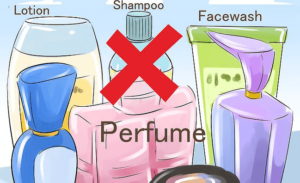
If you are someone who regularly suffers from dry, cracked lips, maybe you should examine other circumstances that might be causing your problems.
Read – Alcohol and Skin Care Products
If you are using anti-aging, acne treatment or exfoliating products, they may be transferred to your lips and causing dryness.
Apply a Natural Lip Balm to your lips before you apply these skin care products to your face. It is important to keep these products away from your lips and use a wet cotton washcloth to clear any of the product that goes onto your lips. Throughout the day, re-apply the Natural Lip Balm to help form a protective barrier so that drying product ingredients don’t go on to the lip surface.
Take care that other personal-care cosmetics are not causing the problems, such as matt or long-lasting lipsticks, lip balms that contain irritating ingredients like perfume or mint.
Could your lip problems be from side effects of the medication you are taking? Certain medicines can cause dry or cracked lips as a side effect. If your condition coincides with the beginning of a new prescription, consult your doctor about this possibility.
Do You Have An Allergy?
If your lips don’t heal with regular use of a good quality lip balm, it might be that you are allergic to particular types of food or the lip care products you are using. People try many chapped lip remedies without any improvement due to the fact various ingredients in lip balms could be causing the allergic reaction.
The most frequent causes of allergic lip chapping are:
Citrus – Even small quantities of citrus can have a massive impact on your lips. This can be from the twist of lemon in your beverage, drinking orange juice, eating an orange, etc.
It is not so easy to avoid citrus if you are a fruit lover, but you can reduce the chapping by applying a fresh coat of good quality Lip Balm just before you eat or drink citrus, and using a straw if you’re drinking anything with citrus, and wash your lips soon after. This might not entirely prevent a reaction, but it lessens the chances.
Mint – Mint is an ingredient found in many products including gum, fresh breath mints, dental products, mint tea, etc.
Cinnamon – Cinnamon in products are not as common, but there is cinnamon in some dental products, teas, and beverages. The careful reading of product labels should help you to avoid it if it causes a reaction.
Lip balms – Many ‘healing’ lip balms designed to treat chapped lips actually contain well-intended healing ingredients that are also allergens!
The most common allergen ingredients include eucalyptus, mint, lanolin, non-mineral sunscreen components and the fragrance and flavors in the lip care products.
If your chapped lips are due to an allergy, they will become sore within a few hours, and chapped within a couple days after exposure to the allergen, but can take a few weeks or sometimes longer to heal.
Could It Be Cheilitis?
The lip chapping that appears from an allergic reaction is called allergic cheilitis (cheilitis means an inflammation of the lip skin). The answer is finding the allergen that causes your lips to dry and chap.
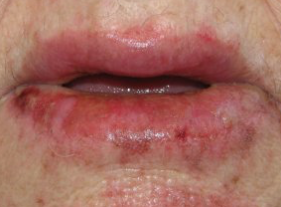
If you see that your lips are red or dark pink, chapped, scaling, and itchy, it could be an indication of a condition called Cheilitis. This can be caused by an infection, identified by cracked skin at the corners of the lips and the mouth cavity may also be affected. A dermatologist can decide whether your dry lips are chapped or if you have cheilitis.
Symptoms Of Cheilitis:
Cheilitis may cause itching, stinging, a burning sensation and discomfort. The soreness associated with Cheilitis spreads a bit further around the mouth creating a ‘red rash’ like effect to the skin.
It can be down to a number of circumstances, both internal and external. The most common causes are eczema, constant sun exposure, and infection.
Cheilitis is usually connected to infections and inflammatory diseases, such as Crohn’s disease. Dental injury and excessive salivating may also turn a typical case of chapped lips into cheilitis. It is also known for Bacteria to enter through the cracks and cause infection.
Eczematous cheilitis is swelling of the lips giving redness with dryness and scaling. It may also be called lip dermatitis. This may be caused by skin diseases such as atopic dermatitis or by coming into contact with allergic or irritant materials. In both situations, you may have outbreaks elsewhere on your body.
Possible causes for getting Eczematous cheilitis range from irritants such as lip licking, which is one of the significant contributors of this type of condition. Other frequent causes of irritant cheilitis may include foods, fragrances, cosmetics, and environmental factors.
Allergic contact cheilitis – a related allergic reaction is identified in at least one-quarter of cases of eczematous cheilitis. Typical sources of allergens include lipsticks and other lip care products, toothpaste and dental materials, foods, medications and nail varnish.
Treatment Of Eczematous Cheilitis:
So that you can determine the type of eczematous cheilitis you may have, there will be an assessment of atopic disease, a complete history that reviews one’s exposure to irritants or allergens and patch testing is invaluable.
Patch testing is required for allergic contact cheilitis. To find out the likely allergens, suspected items from the patient can be tested, along with the general set of allergens available at specialized dermatology centers.
Treatment will depend on the cause. Where an exogenous – refers to an agent or factor from outside the body, has been found, once the reason is found this should be avoided, this should resolve the problem.
If this does not result in change, consider other factors such as a second allergen, irritant or endogenous – refers to an agent or element from inside the body, as possible reasons.
Topical moisturizers and anti-inflammatory creams can relieve the inflammation. Your doctor may decide to prescribe a steroid cream, antibiotics or anti-fungal treatment to help with healing.
How To Cure Dry Cracked Lips:
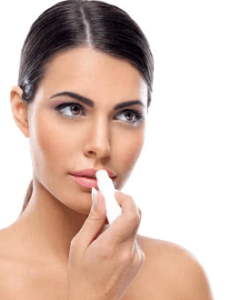
Chapped lips can usually be treated without a visit to your GP, and with good personal care, prevented in the future. The first step is to make sure that your lips have enough moisture. This can be achieved by using lip balms.
Keep Lips Moist:
Use a good quality, soothing lip balm, lip gloss or lipstick with an SPF30 minimum each day. Sun filters titanium dioxide, zinc oxide or avobenzone (butylmethoxydibenzoylmethane) are crucial as part of your daycare. If you spend a lot of time outdoors, re-apply the product every two hours. In the evening apply a calming lip balm to keep the moisture content in your lips.
Read – Best Lip Balm For Dry Chapped Lips
Look for a lip balm that includes almond oil, beeswax, coconut butter, shea butter, or other natural moisturizers – and try to avoid an extra-long list of ingredients that are more likely to aggravate your lips than help them!
Rubbing some natural nut oils and seed butter on your lips can also provide significant relief for cracked and chapped lips.
Avoid using lipstick as a way to moisturize your lips. Lipstick can be dehydrating – you need a protective balm underneath.
Don’t continually lick or pick at your lips when your lips are chapped, and avoid the temptation to keep touching them. Constant picking at the skin on your lips may cause them to bleed, and you risk infection, or a cold sore developing.
These two habits will significantly make the condition worse. Licking your lips may bring short relief, but as the saliva on your lips dissolves, it dries out your lips.
Avoid excessive use of popular skin treatments as they can dry out your skin. Be sure always to read the label, looking for perfumes or fragrances listed in the ingredients. These can burn or agitate your skin, possibly making your lips worse.
Try to use fluoride-free toothpaste. Some people are sensitive to fluoride that not only affects their lips but can also cause additional soreness in the mouth. Switch your toothpaste and see if you notice any improvement.
Change to a toothpaste that doesn’t have sodium lauryl sulfate. Sodium lauryl sulfate is the foaming agent you find in most brands of toothpaste; it can also aggravate ulcers, mouth sores, and chapped lips.
Prevention is always better than a cure. Lip balm helps to prevent dry lips.
Breathing Through Your Mouth:
Try to avoid sleeping or breathing with your mouth open. When you wake in the morning, and you have dry, cracked lips, it is because your mouth was open while you slept. The air that flows in and out of your mouth throughout the night can dry your lips. Try to change your sleeping position to see if it helps.
If your nose is blocked, you will breathe through your mouth to alleviate this, remember to apply a good quality lip treatment – especially before bed to prevent lips from drying out through the night.
Dehydrated Lips And Dehydration:
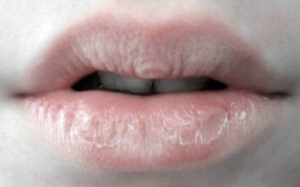
Dry lips could be a sign that your hydration levels are low. Dehydration upsets the healthy balance of minerals in your body and causes havoc on your skin.
It is so important to stay hydrated by drinking the necessary amount of water and eating fresh fruit and vegetables like cucumbers, tomatoes, beans, and watermelons.
Read – Benefits Of Drinking Water For Your Skin
You need to be drinking about 8-10 glasses of water per day. When your body is dehydrated, one of the first places that it shows is your lips. The more water, the better!
Soothing Oils:
For an ultra-moisturizing lip treatment, you should rub a little oil on to your lips. It will help to soothe and moisturize your lips while also protecting them from further damage.
Here are some examples:
Coconut oil
Almond oil
Jojoba oil
Olive oil
Cocoa or shea butter
Rosehip oil
Vitamin Deficiency:
Make sure you are getting the correct amount of the following vitamins to avoid cracked lips. Certain vitamins are crucial to maintaining healthy skin and lips. These include Vitamins A, B, C, B2 (Riboflavin deficiency) B1, B6, and E.
Cheilitis may occur as a symptom of iron deficiency according to the Dermatological Society. Iron dietary supplements can help to improve the problem and in turn, alleviate the itching and dryness.
Get A Humidifier:
Maxi-Cosi Breathe Humidifier
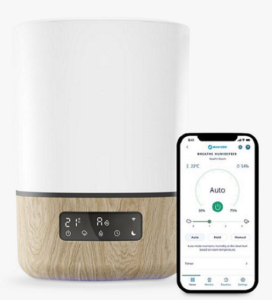 Maxi-Cosi Breathe Humidifier – boots.com
Maxi-Cosi Breathe Humidifier – boots.com
A cleaner, more comfortable environment
A range of smart sensors enable Breathe Humidifier to operate fully in Auto Mode, or if you prefer you can adjust the humidity, mist levels and timers as you go. Breathe Humidifier can also be used as an essential oil diffuser for a scented, soothing snooze.
If you live or work in an air-conditioned environment, use a humidifier. Heating indoor spaces in the winter will cause the air to dry out. Humidifiers can help to put moisture back in the air, and this will definitely help with the problem of dry lips.
Do you suffer from sore, painful lips, what is your secret on how to cure dry cracked lips? Please leave any comments or questions below, and I will be happy to discuss them with you.
jo@yourskincarehelp.com


